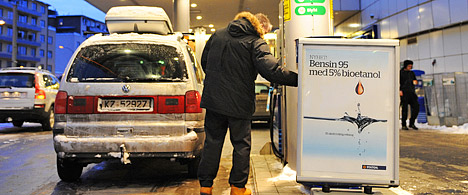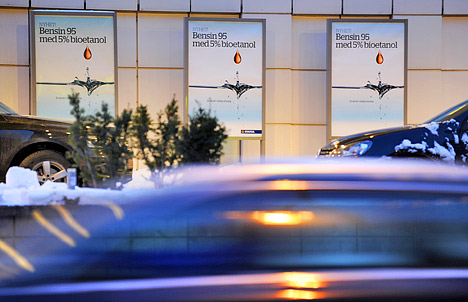
To begin with, it will be the Statoil stations in Southern and Eastern Norway that will market the new biofuel. (Photo: Harald Pettersen)
The new biofuel will reduce carbon emissions by about 11,000 tonnes annually.
All petrol driven vehicles can use Bensin 95 containing 5 per cent bioethanol without making any adjustments to the engine or the fuel system.
“Drivers are now able, for the first time, to refill their cars with biofuel at Statoil filling stations, regardless of whether they have petrol or diesel engines. Our customers can now help save the environment without changing their routines. This is a very pleasing development,” says managing director Dag Roger Rinde.
The introduction of more environmentally suitable petrol in Norway has been made possible by new regulations permitting the import and storage of bioethanol for use as fuel.
The addition of small amounts of biofuel has a considerable effect in volume terms.
An average family will cut its carbon emissions by about 80 kg each year when they move away from regular fuel and start tanking with Bensin 95 containing 5 per cent bioethanol. Nationwide the annual cuts as a result of Statoil’s Bensin 95-launch will amount to 11,000 tonnes.
In 2009 Statoil launched diesel with 7 percent biodiesel throughout Norway. Total emission reductions resulting from Statoil’s biofuel drive in Norway will now stand at about 66,000 tonnes of carbon dioxide per year.
“Biofuel will be an important and practical tool for reducing emissions from the transport sector for many decades hence. But to move on from the current situation we need a set of long-term conditions that allow for new investments. As far as taxation policy is concerned, there should also be clear incentives rewarding persons and companies that make the environmentally appropriate choices,” states Rinde.
To begin with, it will be the Statoil stations supplied by the Sjursøya storage facility – stations in Southern and Eastern Norway – that will market the new biofuel.
The nationwide supply of petrol with 5 per cent bioethanol will entail the need for investments in a new infrastructure for all oil companies in Norway.
If all petrol in Norway in the future is replaced by Bensin 95, the annual carbon dioxide savings for petrol driven cars will exceed 90,000 tonnes when compared to today.
Contacts:
Pål Heldaas, information manager for Statoil Norge AS, tlf: 970 79 763
Knut Hilmar Hansen, press spokesman Statoil Norge AS, tlf: 917 38 053

Facts about bioethanol
- Petrol with up to 5 per cent bioethanol can be used by all petrol driven vehicles because it meets the European quality standard for petrol (EN228). This EU standard states that up to 5 per cent ethanol can be mixed with petrol for use in ordinary vehicles without making any adjustments to the engine or fuel system. Ethanol is eminently suitable as a component in petrol; it has good fuel qualities and gives almost soot-free combustion.
- Petrol containing up to 5 per cent bioethanol has technically the same qualities as current petrol, applying also for use in freezing temperatures.
- Ethanol has a somewhat lower energy content than petrol, but drivers will not experience any noticeable increased consumption when transferring to E5. Statoil sets stringent sustainability requirements to its fuel suppliers, emphasising traceability to verify that deliveries meet these requirements.
- Statoil has many years’ experience of selling bioethanol in Sweden, where we have sold E5 for more than 10 years.
- In 2009 some 60 per cent of Statoil’s bioethanol from Europe was grain-based. The remaining 40 per cent was produced from Brazilian sugar cane. The bioethanol is added to the petrol at the storage facility before the tankers transport the fuel to the filling stations.
- Statoil sells Bioetanol E85 (85 percent bioethanol and 15 per cent petrol) from 19 Statoil stations from Tromsø in the north to Kristiansand in the south. Bioetanol E85 and pure bioethanol can only be used by specially adapted vehicles.
Environmental fuel from Statoil
- Statoil launched Bioetanol E85 in May 2006. We operate 19 E85 filling stations from Tromsø in the north to Kristiansand in the south. Statoil is till the only company in Norway selling Bioetanol E85, which is an environmentally appropriate fuel containing 85 per cent bioethanol and 15 per cent petrol.
- Statoil was the first oil company nationwide to sell a low-rate biodiesel mixture fuel (Diesel B5, later upgraded to B7 – seven per cent biodiesel in ordinary diesel)
- Statoil currently sells a 30-per-cent mixture of biodiesel in ordinary diesel (Diesel B30) to heavy transport users. In addition, Statoil supplies pure biodiesel (Diesel B 100) to industrial customers.
- Statoil was the first company to open hydrogen filling stations in Norway.
- Historically speaking, Statoil led the field in making environmental advances in the Norwegian fuel market:
- Statoil was the first oil company
- to launch lead-free 95-octane petrol
- to remove all lead from petrol in Norway
- to market low-sulphur diesel from its own pumps
And Statoil (as Norol) conducted an extensive, nationwide test that involved mixing methanol with fuel in the early 1980s.